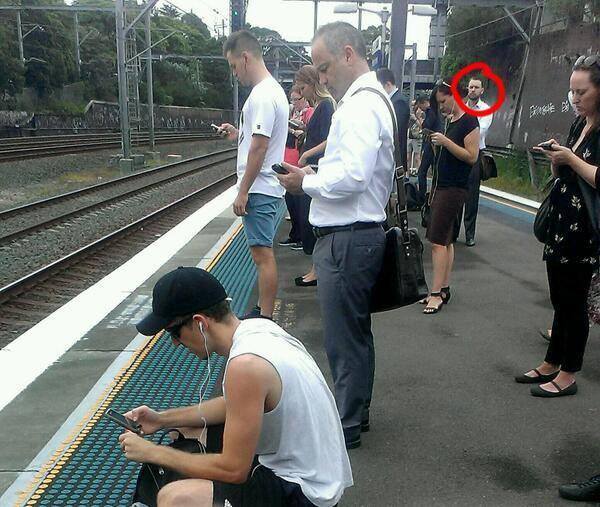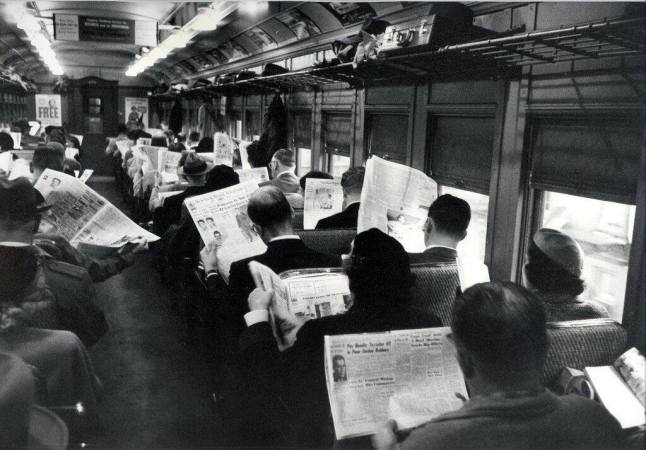Okay, we’ve probably all seen it by now, the latest viral video making the rounds telling us how we are missing our lives, becoming hermits, incapable of “real” relationships and becoming less socially adept because of smart phones, Facebook and twitter. If you have yet to see the latest one (in a long line of them), you can watch it here. My favorite part about these memes and videos is the sheer irony of them being made specifically for people to post and share…ON SOCIAL MEDIA. WITH THEIR SMARTPHONES!
But first, a disclaimer: This post is not a rebuttal of Mr. Turk’s video. Nor is my intent to say we do not need to put down our technology and spend time with people face to face. It is important NOT to prioritize online activity over your partner, children, friends or other relationships. This post is however a plea for us to stop picking at the speck in our neighbor’s eye while we have a plank in our own; for us to keep the baby and pitch the bath water; to eat the fish and discard the bones. As with so many things in life it all comes down to how you relate to something more than the thing itself.
Throughout human history people have loved scolding each other and themselves about the use of the latest technology. Consider the following about the automobile:
The regime of mass car use is an offshoot of our historical aversion to civility itself. The car allows Americans to persist in the delusion that civic life is unnecessary. As a practical matter, this regime is putting us out of business as a civilization. -James Howard Kunstler
“I’m not sure he’s wrong about automobiles…With all their speed forward they may be a step backward in civilization — that is, in spiritual civilization. It may be that they will not add to the beauty of the world, nor to the life of men’s souls… I think men’s minds are going to be changed in subtle ways because of automobiles; just how, though, I could hardly guess. But you can’t have the immense outward changes that they will cause without some inward ones…I shouldn’t be able to defend the gasoline engine, but would have to agree with him that automobiles ‘had no business to be invented.’” -Booth Tarkington
Every man on horseback is an arrogant man, however gentle he may be on foot. The man in the automobile is one thousand times as dangerous. I tell you, it will engender absolute selfishness in mankind if the driving of automobiles becomes common. It will breed violence on a scale never seen before. It will mark the end of the family as we know it…It will destroy the sense of neighborhood and the true sense of Nation. -R.A. Lafferty
Cars, air travel, the telephone, the newspaper, the radio, electric lighting: They all were said to be the end of civilization as we know it. And you know what? They were. Everything ever invented and everyone ever born changes the world as we know it. Change is continually happening and continually feared. All these inventions plus computers, iPads, smartphones, televisions, texting and social media have the potential to be used for positive or negative ends. JUST LIKE EVERYTHING ELSE. What is important is how we relate to these things individually and collectively. Listen, our phones are no different when it comes to the commuters in the picture at the top of this post than newspapers were to an earlier generation. Look at this picture…BOOM. Historied.
We humans enjoy beating ourselves up for things. It makes us feel better somehow to practice self-flagellation (extreme punishment or criticism of oneself) even when we have done nothing wrong. We watch a video or read a meme about how [fill in the blank] is ruining society and we think, yeah that’s bad often without actually examining ourselves or the facts. My friend Michelle A. posted a great reaction to the Gary Turk video a couple days ago in which she said,
Facebook has changed my life for the better. I have used it to encourage others, stay in touch with people I would have otherwise lost, tell funny stories and share pictures with family and friends. I have prayed with people over the phone I have met up with people I hadn’t seen in 15 years and we don’t miss a beat because we know each other’s Facebooks. I have logged my sons special moments I have had spirited debates and long phone calls and loved the downtrodden. It is growing my business so I can change my family tree. I put down the phone and my kids play outside, play with play dough, take walks, see friends and have fun. It’s not the app that’s the problem. It’s user error. To those with a dramatic goodbye letter to Facebook I shrug my shoulders.
Another friend, Matt eloquently pointed out (also on Facebook btw),
With all due respect to Gary Turk and his “Look Up” video, the reality may not be as simple as he puts it. Take, for instance, these Pew Survey results: “The average user of a social networking site has more close ties and is half as likely to be socially isolated as the average American.”
Let’s have a look-see at those Pew Survey results, shall we?
Controlling for other factors we found that someone who uses Facebook several times per day averages 9% more close, core ties in their overall social network compared with other internet users.
We looked at how much total support, emotional support, companionship, and instrumental aid adults receive. On a scale of 100, the average American scored 75/100 on a scale of total support, 75/100 on emotional support (such as receiving advice), 76/100 in companionship (such as having people to spend time with), and 75/100 in instrumental aid (such as having someone to help if they are sick in bed).
Internet users in general score 3 points higher in total support, 6 points higher in companionship, and 4 points higher in instrumental support. A Facebook user who uses the site multiple times per day tends to score an additional 5 points higher in total support, 5 points higher in emotional support, and 5 points higher in companionship, than internet users of similar demographic characteristics. For Facebook users, the additional boost is equivalent to about half the total support that the average American receives as a result of being married or cohabitating with a partner.
In addition to all that Facebook users have revived more dormant relationships. As is often the case, there is so much more to things than meets the eye. So perhaps we should do ourselves and our friends a favor the next time we feel the need to pass along a “convicting”, tisk-tisk, fear-mongering or guilt inducing meme/video and examine our motives. Evaluate our relationships to the people in our lives. Ask for their input. Make adjustments if necessary. But perhaps we should not assume that everyone has a problem just because we do. Maybe we shouldn’t pass something on just because it makes us seem more evolved (Sometimes that backfires and just makes one look like one of those people who dislikes something because it is popular. Not unlike the Michael Jackson backlash after Thriller when I was in junior high or the way some of the hipsters of today reject something popular just to seem cooler than thou). Or maybe we should cut each other a little slack. Stop hating on each other. Stop shaming each other (or our kids) every time we look at our phones. Instead what if we could teach our kids how to have a healthy relationship to their tech by modeling a healthy relationship to our tech. And lastly I hope we can all agree to stop saying, “Those aren’t ‘real’ relationships.” Because, they are. Social media are certainly not the only way nor should they be the only way we connect to, relate or are there for each other. They are also not always the best way (although when I needed a bed for a teenager who was staying with us for six months I had offers for about 10 within 30 minutes of putting it online). In the end however, social networks, smart phones and iPads are a valid and often effective way to meet, connect, reconnect, reach out, ask for help and/or offer help. Let’s make sure we are using them for good rather than abandoning them or demonizing them out of fear.
Below you will find some excellent articles on the positive effects social media are having on teens specifically.
http://www.theguardian.com/lifeandstyle/2013/oct/05/teens-social-networking-good-for-them
http://www.cnn.com/2013/11/21/living/social-media-positives-teens-parents/
http://www.parentfurther.com/technology-media/social-networking/benefits
And yes, I wrote about something similar a while back…https://wordofawoman.com/2013/10/10/the-e-villes-of-smartphones-and-social-media/


